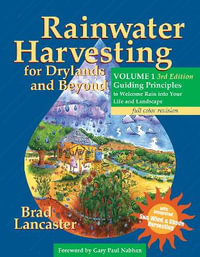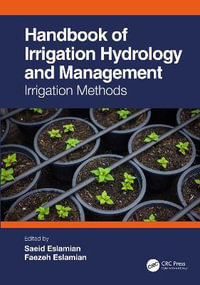
At a Glance
344 Pages
24.6 x 17.4 x 1.91
Paperback
RRP $116.00
$87.75
24%OFF
or 4 interest-free payments of $21.94 with
orAvailable for Backorder. We will order this from our supplier however there isn't a current ETA.
Urban water conflicts manifested first in Europe in the 19th century and are observed nowadays in various forms throughout the world; in particular, in developing countries. Main causes of these conflicts are characterized by complex socioeconomic and institutional issues related to urban water management. The debate about public water services versus private water supplies is frequently associated with conflicts over water price and affordability. On the other hand, the issue of centralization versus decentralization of water utilities is also often discussed in the context of institutional aspects of urban water management. These issues are intertwined and, thereby, a critical examination of socioeconomic and institutional aspects of urban water management in a holistic way is important for better understanding water conflicts in urban areas.
Urban Water Conflicts - the output of a project by UNESCO's International Hydrological Programme on "Socioeconomic and Institutional Aspects in Urban Water Management" - presents a collection of essays on socioeconomic and institutional aspects of urban water management, focusing on water and sanitation services. The book examines interdisciplinary approaches to understanding and analyzing conflicts that arise from inadequate urban water management. Conflict analysis is addressed in some essays by taking into account economic, environmental and social dimensions of sustainability. The issue of institutional conflicts between different levels of government is also discussed in some case studies.
| List of Figures | p. xiii |
| List of Tables | p. xv |
| List of Boxes | p. xvii |
| List of Acronyms | p. xix |
| Glossary | p. xxiii |
| List of Contributors | p. xxvii |
| Introduction | p. xxxi |
| Urban water conflicts: Background and conceptual framework | p. 1 |
| UNESCO-IHP Taskforce on Urban Water Conflicts | p. 1 |
| Socioeconomic and institutional aspects of urban water management | p. 2 |
| Definition of urban water: an impure public good | p. 4 |
| A few methodologies for analysing urban water conflicts | p. 9 |
| Conclusions | p. 13 |
| Urban water conflicts in recent European history: Changing interactions between technology, environment and society | p. 15 |
| Introduction | p. 15 |
| Governments intervene to provide long distance supply of clean water | p. 17 |
| From quantity at a distance to quality close at hand | p. 20 |
| The crisis of municipal water supply services | p. 23 |
| European water services and the three Es of sustainability | p. 25 |
| The new social issue of sustainability | p. 28 |
| Conclusion | p. 30 |
| Water, public responsibility and equity: The Barcelona 'water war' of the 1990s | p. 33 |
| Full circle? Public responsibility versus privatization of water supplies in the United States | p. 39 |
| Urban water supply before 1830 | p. 40 |
| The rise of the public water utility, 1830-1920 | p. 41 |
| Expansion of water supply systems, 1920-1945 | p. 44 |
| Metropolitan expansion and new demands on water supplies, 1945-1970 | p. 45 |
| From infrastructure crisis to privatization, 1970-2004 | p. 46 |
| Conclusion | p. 53 |
| Public-private partnership in courts: The rise and fall of concessions to supply drinking water in France (1875-1928) | p. 57 |
| Corpus and context | p. 58 |
| The origin of conflicts: is drinking water a profit-oriented service? | p. 60 |
| CE position: under a concession contract, drinking water is a profit-oriented activity | p. 62 |
| Amendments should be negotiated by the parties on the grounds of the initial contract's status quo | p. 63 |
| Local authorities had no right to renegotiate access to private service | p. 63 |
| The CE restrictions on contract termination | p. 64 |
| The consequence of CE decisions on water supply management | p. 64 |
| Conclusion | p. 66 |
| In search of (hidden) Portuguese urban water conflicts: The Lisbon water story (1856-2006) | p. 69 |
| A century of Portuguese water services: evolution, accomplishments and failures | p. 69 |
| The Lisbon water story | p. 74 |
| Liberal waters (1858-1926) | p. 74 |
| Authoritarian waters (1926-1974) | p. 78 |
| Democratic waters (1974-2006) | p. 81 |
| Urban water conflicts: from the unfinished welfare state to the new regulatory state | p. 84 |
| Concluding remarks: hidden conflicts or potential conflicts? | p. 87 |
| Water supply services in the cities of Brazil: Conflicts, challenges and new opportunities in regulation | p. 93 |
| Introduction | p. 93 |
| The institutional conflicts and challenges | p. 95 |
| Economic conflicts and challenges | p. 99 |
| Socio-environmental challenges and conflicts: social inequality and environmental degradation | p. 104 |
| New opportunities in water and services management: regulation and conflict-resolution | p. 106 |
| Urban water conflicts in Buenos Aires: Voices questioning the sustainability of the water and sewerage concession | p. 111 |
| Introduction | p. 111 |
| The social urban context | p. 112 |
| Water services before privatization | p. 112 |
| The private sector operating the largest water concession in the world | p. 113 |
| Development of the chapter | p. 115 |
| Economic sustainability issues leading to political conflict and conflict among users | p. 115 |
| Financing the expansion of the network: the SUMA conflict | p. 115 |
| Devaluation of the Argentinean peso: renegotiation of the concession contract | p. 117 |
| Social sustainability issues: bringing water services to the poor | p. 120 |
| Bringing water and sewerage networks to poor neighbourhoods | p. 120 |
| The social tariff: a response to the recent inability of Argentina's middle class to cope with the water bill | p. 123 |
| The evolution of the 'environmental question' in the context of the water sector privatization and the concession process | p. 123 |
| Water table rise, flooding and environmental conflict | p. 124 |
| Urban water conflict and environmental conflict: the Lomas de Zamora Water Forum | p. 125 |
| The 'environmental problem' and the need for a responding institution | p. 126 |
| Conclusion | p. 127 |
| In search of meaningful interdisciplinarity: Understanding urban water conflicts in Mexico | p. 129 |
| Introduction | p. 129 |
| Urban water conflicts in Mexico from a historical perspective | p. 129 |
| Urban water conflict events in Mexico | p. 132 |
| Explaining urban water conflicts | p. 139 |
| Concluding remarks | p. 142 |
| Conflict versus cooperation between the state and civil society: A water-demand management comparison between Cape Town and Johannesburg, South Africa | p. 147 |
| Background to the South African water context | p. 149 |
| Case study 1: Johannesburg | p. 150 |
| Institutional profile of water service provision in Johannesburg | p. 150 |
| The Gcin' Amanzi Project | p. 151 |
| Community response | p. 154 |
| Case study 2: Cape Town | p. 156 |
| The state of municipal debt: the driver behind Cape Town's WDM approach | p. 157 |
| Mfuleni pilot project | p. 158 |
| Water saving device options | p. 159 |
| CSO response | p. 161 |
| The political terrain of the two cities | p. 161 |
| Conclusion | p. 165 |
| Conflicts of influence and competing models: The boom in community-based privatization of water services in sub-Saharan Africa | p. 169 |
| Water supply systems in urban areas with no network connection | p. 171 |
| Dispelling a myth: the spread of public-private partnerships from large cities | p. 171 |
| Project-based rationale and systems involving decentralized players: behind the profusion, a model | p. 178 |
| The limitations of community-based privatization | p. 180 |
| Dysfunctions of the model… | p. 180 |
| … or an unsuitable model? | p. 181 |
| The community-based model versus the public model: ideological domination at stake | p. 184 |
| The need for efficient sectoral approaches and depoliticization of management | p. 185 |
| The supposed advantages of community-based regulation | p. 185 |
| A deep distrust of local public authorities | p. 188 |
| Conclusion | p. 190 |
| Governance failure: Urban water and conflict in Jakarta, Indonesia | p. 195 |
| Introduction: watering Jakarta | p. 195 |
| Splintered urbanism: fragmented access to urban water supply | p. 196 |
| Urban governance: the production of thirst | p. 198 |
| Going private: conflict over the water supply concession contract for the city of Jakarta | p. 202 |
| The private sector participation contract in Jakarta | p. 203 |
| Re-regulation: tariffs, profits and conflictual re-negotiation of the contract | p. 206 |
| Conflicts with water utility workers: labour-led protests and unrest | p. 207 |
| Connecting the poor? Conflict over tariffs and pricing | p. 208 |
| Pro-poor initiatives | p. 211 |
| Conclusions: governance failure | p. 214 |
| Man-made scarcity, unsustainability and urban water conflicts in Indian cities | p. 221 |
| Introduction | p. 221 |
| Our understanding of urban water conflicts | p. 222 |
| The issue of water access in Delhi | p. 223 |
| Users' strategies and cross-bred networks | p. 224 |
| The question of sustainability | p. 225 |
| A chaotic reform process and unexpected outcomes | p. 226 |
| Chennai: expanding needs and growing conflicts with peri-urban users | p. 228 |
| The central role of the peripheral groundwater | p. 229 |
| Short-term winners and losers: a transition towards conflict? | p. 230 |
| Conclusion: a common framework of weak and ineffective conflict resolution mechanisms | p. 233 |
| Urban water conflicts in the western US | p. 237 |
| Water development and the environment | p. 238 |
| Water in California and the transfer from agriculture to urban areas | p. 238 |
| Introduction to the Imperial Valley case | p. 240 |
| The decision-making process leading to trading | p. 241 |
| Decision-making in San Diego | p. 243 |
| Institutions, spatial scale and inter-regional relations | p. 245 |
| Conclusion | p. 245 |
| Urban water reform in Italy: A live bomb behind outward unanimity | p. 247 |
| The weaving of Penelope | p. 247 |
| Path towards the reform: the crisis of the traditional model | p. 249 |
| The reform | p. 254 |
| A new model for providing WSS: challenges and trade-offs | p. 257 |
| Implementing the WFD: the first challenge for the privatized water system | p. 261 |
| Conclusions | p. 265 |
| Water infrastructures between commercialization and shrinking: The case of Eastern Germany | p. 269 |
| Introduction | p. 269 |
| The German water market in transition: the main transformations in water supply and wastewater disposal | p. 270 |
| From 'flourishing landscapes' to shrinking regions: post-reunification developments in Eastern Germany | p. 272 |
| Conflicts about infrastructure supply and privatization: the case of Brandenburg and Frankfurt (Oder) | p. 275 |
| Learning from shrinking regions | p. 279 |
| Urban water conflicts and sustainability: An ecological-economic approach | p. 285 |
| Introduction | p. 285 |
| Sustainability and carrying capacity in the water domain | p. 286 |
| The parabola of urban water systems | p. 291 |
| The 'further from farther' crisis | p. 291 |
| Modernization and sustainability of urban water management | p. 294 |
| Drivers of modernization | p. 296 |
| Towards a general understanding of UWC | p. 299 |
| Conflicts as indicators of urban water sustainability | p. 299 |
| Interpretative frames: actors in conflict | p. 300 |
| Interpretative frames: categories of conflict | p. 305 |
| Index | p. 311 |
| Table of Contents provided by Ingram. All Rights Reserved. |
ISBN: 9780415498630
ISBN-10: 0415498635
Series: Urban Water Series
Published: 2nd December 2011
Format: Paperback
Language: English
Number of Pages: 344
Audience: Professional and Scholarly
Publisher: Taylor & Francis Ltd
Country of Publication: GB
Edition Number: 1
Dimensions (cm): 24.6 x 17.4 x 1.91
Weight (kg): 0.7
Shipping
| Standard Shipping | Express Shipping | |
|---|---|---|
| Metro postcodes: | $9.99 | $14.95 |
| Regional postcodes: | $9.99 | $14.95 |
| Rural postcodes: | $9.99 | $14.95 |
How to return your order
At Booktopia, we offer hassle-free returns in accordance with our returns policy. If you wish to return an item, please get in touch with Booktopia Customer Care.
Additional postage charges may be applicable.
Defective items
If there is a problem with any of the items received for your order then the Booktopia Customer Care team is ready to assist you.
For more info please visit our Help Centre.
You Can Find This Book In
This product is categorised by
- Non-FictionEngineering & TechnologyEnvironmental ScienceSanitary & Municipal EngineeringWater Supply & Treatment
- Non-FictionEarth Sciences, Geography, Environment, PlanningThe EnvironmentConservation of The Environment
- Non-FictionEngineering & TechnologyCivil Engineering
- Non-FictionIndustry & Industrial StudiesEnergy Industries & UtilitiesWater Industries























